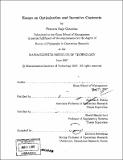| dc.contributor.advisor | Andreas S. Schulz and David Simchi-Levi. | en_US |
| dc.contributor.author | Goundan, Pranava Raja | en_US |
| dc.contributor.other | Massachusetts Institute of Technology. Operations Research Center. | en_US |
| dc.date.accessioned | 2008-02-27T22:18:11Z | |
| dc.date.available | 2008-02-27T22:18:11Z | |
| dc.date.copyright | 2007 | en_US |
| dc.date.issued | 2007 | en_US |
| dc.identifier.uri | http://hdl.handle.net/1721.1/40383 | |
| dc.description | Includes bibliographical references (p. 167-176). | en_US |
| dc.description | Thesis (Ph. D.)--Massachusetts Institute of Technology, Sloan School of Management, Operations Research Center, 2007. | en_US |
| dc.description.abstract | (cont.) In the second part of the thesis, we focus on the design and analysis of simple, possibly non-coordinating contracts in a single-supplier, multi-retailer supply chain where retailers make both pricing and inventory decisions. Specifically, we introduce a buy-back menu contract to improve supply chain efficiency, and compare two systems, one in which the retailers compete against each other, and another in which the retailers coordinate their decisions to maximize total expected retailer profit. In a linear additive demand setting, we show that for either retailer configuration, the proposed buy-back menu guarantees the supplier, and hence the supply chain, at least 50% of the optimal global supply chain profit. In particular, in a coordinated retailers system, the contract guarantees the supply chain at least 75% of the optimal global supply chain profit. We also analyze the impact of retail price caps on supply chain performance in this setting. | en_US |
| dc.description.abstract | In this thesis, we study important facets of two problems in methodological and applied operations research. In the first part of the thesis, motivated by optimization problems that arise in the context of Internet advertising, we explore the performance of the greedy algorithm in solving submodular set function maximization problems over various constraint structures. Most classic results about the greedy algorithm assume the existence of an optimal polynomial-time incremental oracle that identifies in any iteration, an element of maximum incremental value to the solution at hand. In the presence of only an approximate incremental oracle, we generalize the performance bounds of the greedy algorithm in maximizing nondecreasing submodular functions over special classes of matroids and independence systems. Subsequently, we unify and improve on various results in the literature for problems that are specific instances of maximizing nondecreasing submodular functions in the presence of an approximate incremental oracle. We also propose a randomized algorithm that improves upon the previous best-known 2-approximation result for the problem of maximizing a submodular function over a partition matroid. | en_US |
| dc.description.statementofresponsibility | by Pranava Raja Goundan. | en_US |
| dc.format.extent | 176 p. | en_US |
| dc.language.iso | eng | en_US |
| dc.publisher | Massachusetts Institute of Technology | en_US |
| dc.rights | M.I.T. theses are protected by copyright. They may be viewed from this source for any purpose, but reproduction or distribution in any format is prohibited without written permission. See provided URL for inquiries about permission. | en_US |
| dc.rights.uri | http://dspace.mit.edu/handle/1721.1/7582 | |
| dc.subject | Operations Research Center. | en_US |
| dc.title | Essays on optimization and incentive contracts | en_US |
| dc.type | Thesis | en_US |
| dc.description.degree | Ph.D. | en_US |
| dc.contributor.department | Massachusetts Institute of Technology. Operations Research Center | |
| dc.contributor.department | Sloan School of Management | |
| dc.identifier.oclc | 191106560 | en_US |
